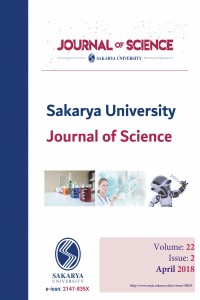Sakarya Üniversitesi Endüstri Mühendisliği bölümünde uygulamalı mühendislik deneyimi modeli ve öğrenciler üzerindeki etkileri
Abstract
Dünya’da ve Türkiye’de, üniversite-sanayi işbirliği
kapsamında çeşitli işbirliği faaliyetleri sürdürülmektedir. Uygulamalı eğitim
modeli bu faaliyetlerin başında gelmektedir ve bu model üniversiteler
tarafından üretilen teorik bilginin gerçek dünya problemlerinde kullanılmasını
amaçlar. Bununla birlikte, uygulamalı eğitim programına katılan öğrencilerin
gelecek kararı, özgüven, mesleki öz
yeterlilik ve kaygı gibi konularda olumlu bir şekilde ilerlemeleri beklenmektedir.
Bu çalışmada, Sakarya Üniversitesi Mühendislik Fakültesi tarafından
geliştirilen ve ilk uygulaması Endüstri Mühendisliği bölümünde gerçekleştirilen
Uygulamalı Mühendislik Deneyimi Eğitimi (UMDE) programı açıklanmıştır. Aynı
zamanda, UMDE programına katılan ve katılmayan öğrenciler arasındaki fark
istatistiksel olarak araştırılmıştır.
Araştırma sonucunda UMDE programına katılan ve katılmayan öğrenciler
arasında gelecek kararı, mesleki öz yeterlilik ve kaygı seviyelerinde
istatiksel olarak anlamlı bir farklılık olduğu belirlenmiştir.
Keywords
Uygulamalı eğitim Üniversite-sanayi işbirliği Uygulamalı mühendislik deneyimi eğitimi (UMDE)
References
- G. Doğan and B. Üstün, “Türkiye’de Üniversite Sanayi İşbirliğini Etkinleştirme Yolları,” in VII.Ulusal Uçak,Havacılık ve Uzay Mühendisliği Kurultayı, 2013, pp. 227–232.
- M. Cengiz Toklu, “Yüksek Öğretim Kurumlarında Ortak Eğitim Modeli Ve Bir Uygulaması,” in International Conference on Quality in Higher Education (ICQH), 2016, pp. 1089–1092.
- B. F. Blair, M. Millea, and J. Hammer, “The impact of cooperative education on academic performance and compensation of engieering majors.pdf,” J. Eng. Educ., vol. 93, no. 4, pp. 333–338, 2004.
- M. T. Gençoğlu and M. Cebeci, “Türkiye’de Mühendislik Eğitimi ve Öneriler,” in Mühendislik-Mimarlık Eğitimi Sempozyumu, 1999, pp. 73–80.
- M. Haddara and H. Skanes, “A reflection on cooperative education: from experience to experiential learning,” Asia-Pacific J. Coop. Educ., vol. 8, no. 1, pp. 67–76, 2007.
- N. Köklü, “Tutumların ölçülmesi ve likert tipi ölçeklerde kullanılan seçenekler,” Ankara Üniversitesi Eğitim Bilim. Fakültesi Derg., vol. 28, no. 2, pp. 81–93, 1995.
- A. S. Albayrak, A. Eroğlu, Ş. Kalaycı, E. Küçüksille, B. Ak, M. Karaatlı, H. Keskin, E. Çiçek, A. Kayış, Ö. Antalyalı, N. Uçar, H. Demirgil, D. İşler, and O. Sungur, SPSS Uygulamalı Çok Değişkenli İstatistik Teknikleri.pdf, 5th ed. Ankara: Asil Yayın Dağıtım, 2010.
Applied engineering experience model in Sakarya University Industrial Engineering department and effects on students
Abstract
In the world and Turkey, various cooperation activities are
carried out within the scope of university-industry cooperation. The Applied
education model, is at the beginning of these activities and this model aims to
use the theoretical knowledge produced by universities in real world problems.
In addition to this, it is expected that the students participating in the
applied education program will progress positively on issues such as future
decision, self-confidence, occupational self-efficacy and anxiety. In this
study, Applied Engineering Experience Education (UMDE) program developed by the
Faculty of Engineering of Sakarya University and first implemented in the
Department of Industrial Engineering is explained. On the other hand, the
difference between the students who participated and who did not participate in
the UMDE program was investigated statistically. As a result of the study, it
was determined that there is a statistically significant difference in the level
of future decision, occupational self-efficacy and anxiety among the students
who participated in and did not participate in the UMDE program.
Keywords
University industry collaboration applied education co-operative education applied engineering experience education
References
- G. Doğan and B. Üstün, “Türkiye’de Üniversite Sanayi İşbirliğini Etkinleştirme Yolları,” in VII.Ulusal Uçak,Havacılık ve Uzay Mühendisliği Kurultayı, 2013, pp. 227–232.
- M. Cengiz Toklu, “Yüksek Öğretim Kurumlarında Ortak Eğitim Modeli Ve Bir Uygulaması,” in International Conference on Quality in Higher Education (ICQH), 2016, pp. 1089–1092.
- B. F. Blair, M. Millea, and J. Hammer, “The impact of cooperative education on academic performance and compensation of engieering majors.pdf,” J. Eng. Educ., vol. 93, no. 4, pp. 333–338, 2004.
- M. T. Gençoğlu and M. Cebeci, “Türkiye’de Mühendislik Eğitimi ve Öneriler,” in Mühendislik-Mimarlık Eğitimi Sempozyumu, 1999, pp. 73–80.
- M. Haddara and H. Skanes, “A reflection on cooperative education: from experience to experiential learning,” Asia-Pacific J. Coop. Educ., vol. 8, no. 1, pp. 67–76, 2007.
- N. Köklü, “Tutumların ölçülmesi ve likert tipi ölçeklerde kullanılan seçenekler,” Ankara Üniversitesi Eğitim Bilim. Fakültesi Derg., vol. 28, no. 2, pp. 81–93, 1995.
- A. S. Albayrak, A. Eroğlu, Ş. Kalaycı, E. Küçüksille, B. Ak, M. Karaatlı, H. Keskin, E. Çiçek, A. Kayış, Ö. Antalyalı, N. Uçar, H. Demirgil, D. İşler, and O. Sungur, SPSS Uygulamalı Çok Değişkenli İstatistik Teknikleri.pdf, 5th ed. Ankara: Asil Yayın Dağıtım, 2010.
Details
| Primary Language | Turkish |
|---|---|
| Subjects | Industrial Engineering |
| Journal Section | Research Articles |
| Authors | |
| Publication Date | April 1, 2018 |
| Submission Date | August 26, 2017 |
| Acceptance Date | March 7, 2018 |
| Published in Issue | Year 2018 Volume: 22 Issue: 2 |
Cite
INDEXING & ABSTRACTING & ARCHIVING
Bu eser Creative Commons Atıf-Ticari Olmayan 4.0 Uluslararası Lisans kapsamında lisanslanmıştır .

